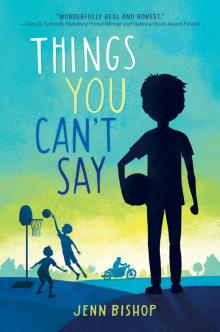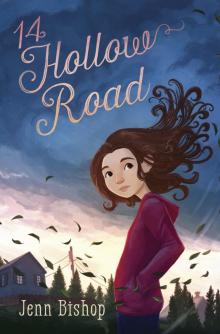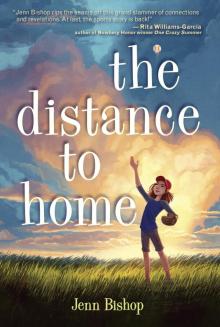- Home
- Jenn Bishop
Things You Can't Say Page 3
Things You Can't Say Read online
Page 3
I’m chopping up the artichoke hearts on the cutting board when Xander pads into the room behind me.
“Is Filipe coming for dinner?” he asks.
I wish. “No.”
“Then why are there four place mats?”
“Mom’s friend is coming.”
“Ashley?”
“No.”
“Mrs. Eisenberg?”
“No.”
“Is it—”
“Stop, Xan.”
“Why are you so grouchy?”
“It’s Mom’s friend from out of town. Phil.”
“A friend’s visiting? Cool.”
Xander pads back into the living room to watch his show, and I chop harder.
4
HE’S LATE.
The pasta’s been done for a good fifteen minutes, but the sauce still simmers on the stove. As I stirred and stirred it, I added more and more red pepper flakes. Mom, Xander, and I can stand the heat, but can he?
While the pasta sits in the strainer by the sink getting all stuck together, Mom keeps checking her phone. I swear she’s redone her ponytail about fifty trillion times.
Xan and I sit at the kitchen table. He’s looking about ready to eat his napkin when the doorbell rings. While Mom’s answering the door, I switch over to Dad’s old spot. “You don’t sit there,” Xan says.
“I do tonight.” I hope the glare I shoot him tells him to leave it be, at least until that guy leaves.
We can’t see the front door from the kitchen, which is fine by me. I don’t want to know what Mom does when she sees this guy. Do they hug? Does he kiss her? Does she kiss him? I swallow hard at the thought. I want to be able to eat my dinner without barfing it up.
He and Mom walk into the kitchen. Mom’s hair is down now. Down, up. Down, up. If she can’t decide how she wants her hair, maybe she isn’t so certain he’ll be staying with us after all, right? A couple days.
“Xan, Drew, I’d like you to meet my friend Phil. Phil and I went to high school together. Gosh, that’s a lot longer ago than it feels, huh?”
“What’s your last name?” Xan asks. Ever since the spring, he’s been obsessed with everyone’s last names and learning how to spell them.
Mom gives Xan a be on your best behavior or else eyeball.
“Pittman,” he says.
“Okay, so … um, P. I. T.…”
“Honey, he can show you how to spell it later,” Mom says. “After dinner.” She turns to Phil. “Well, these are my boys. Drew’s twelve and Xander is six.”
“And a quarter.” Xan nods for emphasis.
Mom licks her lips. “Well, um, how about you have a seat, Phil. I’ll just serve up this pasta and, um, get you a glass of—is water all right?”
Whenever Mom has a difficult patron at the library, she describes every single thing she’s doing out loud. Maybe it makes her less nervous. Or maybe it makes her feel like she’s in control instead of the cranky, pushy person. Why’s she doing it with Phil, though? If he’s just an old friend like she said, what reason would she have to be so nervous?
Now that I’m in Dad’s seat, Phil is directly across from me. I didn’t think this out so well.
Mom sets down plates of spaghetti in front of Xan and me. When she comes back with plates for her and Phil, I notice that her eyelashes look longer and darker. Did she put on makeup for him?
She sits in her usual seat and places her napkin on her lap. “I can’t remember,” she says to Phil. “Do you—did your folks say grace?”
Phil shakes his head. “We were lucky if the food made it to the table before it got gobbled up.” He laughs.
Mom laughs too. Even though it’s not like what he said was that funny.
“Well,” Mom says, blushing. “Let’s dig in.”
5
PHIL’S BARELY POPPED IN A bite of pasta when he starts to cough. “Whew,” he says, reaching for his glass of water, “that’s got some kick, Kayla.”
Mom side-eyes me.
“What?” I mouth.
Xan pushes his pasta to the back corner of his plate.
I swirl a big honking bite around my fork and shove the whole thing in my mouth. Oh man. Maybe I did go a little overboard with the red pepper flakes. My tongue tingles and burns something fierce. But I can’t let Phil see. No way. Thankfully, I know the secret trick. The thing I have that Phil doesn’t: milk.
I reach for my glass and take a long drink, calming the fire in my throat. “Doesn’t seem too hot to me,” I say with a shrug.
“Drew’s been such a big help around the house ever since …” Mom clears her throat.
“My dad died,” Xander blurts out.
I reach my foot under the table and give my brother a little kick. Why does this dude need to know?
“I’m so sorry, bud. It’s really hard to lose someone you love.” Phil glances over at Mom after he says it. But the weirder part is the way he sounds. Like it’s not actually news to him. Like he’s prepared, maybe even practiced for this moment.
“Yeah,” Xan says quietly. “Except I don’t really remember him so much.” He shrugs and takes a cautiously small bite of spaghetti.
Phil reaches across the table and gently pats his hand.
I tuck my left hand under my leg in case that kind of behavior is contagious.
“Drew’s gotten really into cooking,” Mom says. “Though maybe he took it a little too far with the spice rack tonight.”
“I know my way around a kitchen pretty well, myself. So, Drew, is spaghetti your specialty?”
There’s something about the way he says it. The tiniest bit of sarcasm, but not enough that Mom seems to pick up on it.
“Yeah. I make a real mean boxed mac and cheese. And you should see the toast I made the other day.”
“Drew!” Mom gives me the eye. “Cut it out.”
“What?”
“You know what? I’m sorry, Drew. I wasn’t trying to offend you at all. It’s just—I’m into cooking too, and I can appreciate the effort here. It would be nice to talk recipes with you sometime. Hear some of your favorites. Us guys who know our way around the kitchen, we need to stick together, right?” He swirls his fork around in the spaghetti. As he puts it in his mouth, a bit of the sauce sticks to the bottom of his lip. Mom dabs at her mouth to tell him.
I slurp up another forkful so I can get away without saying anything back.
Us guys who know our way around the kitchen? Guys?
How about nine years old with a brother still in diapers and a mom who could barely get out of bed. Grandma had gone back home to California, convinced we were doing better. The truth is, we did eat mac and cheese. But not even the boxed kind yet—the microwave kind from Trader Joe’s. And toast, burned half the time.
That was the best I could do.
I try to swallow away that ball in my throat, the one that comes back every now and then. My eyes smart. Guess maybe the sauce was too spicy, even for me.
The first time I tried to make rice and it all burned and stuck to the pot. That time I didn’t know the difference between a bulb of garlic and a clove. It’s like a highlight reel playing in my head, except actually more like a low-light reel. When I finally pull myself out of it, Mom and Phil are catching up on the life history of every single person they know from high school. Next comes Phil’s interrogation of Xan and me. Questions like: What’s your favorite sport? (Me: Um. Xan: Tennis.) And: What do you want to be when you grow up? (Me: A lawyer or an architect. Xan: A blacksmith.) Mom says she still isn’t sure what she wants to be when she grows up, and I catch him smiling at her in this dumb, goofy way like they’re in a romantic comedy.
I don’t think I can take it for one second longer.
“Can I be excused?” I ask Mom.
“Me too? I’m done,” Xander says, even though he’s only eaten half the food on his plate.
Mom glances at Phil, as if there’s something the two of them have to decide.
“Sure, boys,” she say
s, but her eyes aren’t looking at either of us.
I grab my plate and Xan’s and bring them to the sink. Mom looks like she wants to keep sitting there, talking to Phil all night. Old friend? Sure, Mom. Sure. Filipe was right.
“Leave the dishes, Drew,” Mom says. “I’ll take care of them later.”
I put my glass down on top of the plates with a clink.
“Can you help get your brother ready for bed?”
I look at the clock. “It’s only seven thirty. And it’s summer.”
“He seems tired. And there’s something going around at his camp. Honey, please?”
Xan’s already dumped out a box of Legos in the living room.
“Mom says you’ve got to get ready for bed,” I tell him.
“Already?”
Someone wants some alone time. With Phil. The thought makes my stomach clench again.
I lower my voice. “You can still play upstairs in your room. Just … quieter.”
“Okay,” Xan says.
As he puts on his pajamas and brushes his teeth, I lean against the wall in the upstairs hallway, wondering what he thinks about Phil. How does his six-and-a-quarter-year-old brain make sense of this guy we never heard of before just appearing at our door? Helping himself to our food. Sitting at our table with us. Looking at Mom like that.
The thing is, we know Mom’s friends. Mom’s friends don’t look anything like him. For one, they shower regularly. And two, they do not drive around on motorcycles. They drive cars like normal people.
Xan lets out a big yawn. So maybe Mom’s right. Maybe he really is sleepy.
“You sure you want to play?”
Xan climbs into his bed. “Read me a story?”
I grab Dory Fantasmagory from his bookshelf and start reading. A few pages in, Xan closes his eyes, and then his breathing slows way down and I know he’s asleep.
Downstairs Mom and Phil are still talking in the kitchen, the dirty dishes piled in the sink. Part of me wants to start cleaning up and see if all that noise makes a difference, but the other part of me worries they won’t even notice. I slip out the sliding glass door.
It’s dark outside and quiet, except for the crickets and the frogs. As I step off the deck and down into the grass, the outside light comes on, lighting up the whole backyard. If they’re paying attention, maybe they’ll wonder who’s out here. Maybe they’ll think it’s a burglar or something.
But they aren’t going to notice, are they?
I pad through the grass and into the shed, which until a few weeks ago was covered in cobwebs and overgrown vines. I close the door behind me and flick on the light. After a few minutes, that outside light will go off—it’s motion sensitive. They won’t know I’m out here. The shed doesn’t have any windows facing the house, only a skylight and a big window looking out the back of it where Dad set up bird feeders.
Inside, it’s a mess. One of Mom’s friends at the library—Julia—convinced her it was time to do something with this place. Turn it into a “she shed.” I know, right? I guess it’s a thing now. Right now it’s still in transition. Boxes everywhere. Cans of paint that Mom still hasn’t opened. What kind of color even is perfect greige, anyway? Dad’s old Paw Sox pennant from before they moved to Worcester sticks out of one of the boxes—there are so many of them. One whole stack, box after box labeled FRAGILE.
Fragile. Why didn’t someone bother to label Dad like that? Maybe then I would’ve known what could happen. Maybe then it wouldn’t have been such a shock.
The thing no one tells you when you get older is how the stuff you believed so easily when you were nine doesn’t make sense anymore. Not just Santa and the tooth fairy, but the big stuff. Like when you get called out of class one Tuesday and your mom is there in the front office with her best friend and her eyes are puffy and her cardigan is falling off her shoulders but she doesn’t even seem to notice. And then, when you finally get back home after a car ride that seems to last a lifetime even though there’s only ten minutes, tops, between school and home, she says words that don’t make any sense at all. That your dad—your Dad—killed himself.
Other people, you learn, other people will use the words “committed suicide,” but that’s not true. He didn’t choose it. His brain was sick—those were the exact words Mom used—and he couldn’t see that there were other choices. That there was help. I knew what it was like to get sick. Nobody chooses to get sick.
But three years is a long time. And now I don’t know. If Dad was so sick, if he really was depressed, how come I couldn’t tell? He was my dad. I should have been able to tell that something was wrong. And if I hadn’t been able to tell that something was wrong with him, that meant that other people, other people I knew, could be in pain, could be sick the way my dad was.
And if there were other options, how come he couldn’t see them? He was smart, my dad. The smartest person I knew.
It was easy to believe it then, the things Mom and the counselor said to me. They were adults, and I was only nine. They knew more than me then. But the more I thought about it, the more I turned it over in my mind the past few years, all of it just fell apart. I kept looking for clues, remembering the days leading up to when it happened. But I couldn’t come up with anything. Not one thing.
For a few months after Dad died, on Wednesday evenings Mom would take me to Chad’s House. It was a big yellow Victorian up on a hill in Providence where I’d hang out with all these other kids who had someone they loved die from suicide. We were members of the worst club ever. They were the only people I’ve ever met who “got” it—who understood that it was different, how Dad died.
When I went back to school after, my third-grade teacher, Mrs. Sprouse, kept trying to make me feel okay talking about it. She’d let me know if another kid in my class lost their grandpa or their pet. As if it was at all the same thing.
But even the kids at Chad’s House, none of them entirely understood what it was like for me. Trina’s dad had been in trouble with drugs before, so Trina had to live with her grandparents. And Liam’s mom had been depressed for a long time, had actually tried to kill herself before. All of them had known for years that things weren’t okay with their parents. It didn’t happen out of nowhere, not like with my dad.
The only way I could make sense of it was by believing—accepting, or trying to, anyway—that my dad was a liar. He had lied about everything. For years—my whole life—he had pretended to be happy when clearly he wasn’t. He’d tricked us all into believing nothing was wrong when actually something was very, very wrong.
He’d faked his whole life with us. And it was a nice life, too, with the four of us. He and Mom didn’t fight, not like some parents. The weekend before he died, we went on this big camping trip with Filipe’s family. And Dad seemed totally normal. He definitely wasn’t sad. He had three s’mores that last night. Three. I mean, who does that and then kills themself?
Maybe if he’d just told the truth, he would still be here. With me—with us.
I step over the paint cans and pull out one of the boxes labeled FRAGILE. The top is dusty, like these boxes have been packed up for a while. I never came in here to see. I didn’t want to see Dad’s stuff—Dad’s life—in boxes. I slip off the top and reach my hand through all the foam peanuts until I touch glass.
I know what it is before I even lift out the clear glass bottle and peer at the ship inside. For how small it is, there’s so much detail.
Dad used to spend hours in here, long into the night sometimes. Painting these ships, with parts so tiny he had to use a magnifying glass. He’d have a ball game playing on the radio, or sometimes music.
So many hours in here, all by himself. He couldn’t just read a book while Xan and I watched TV or played, like Filipe’s dad. He had to hide away in a shed in his own backyard.
Fragile.
I shake the bottle, at first just a little shake. All those tiny, perfect pieces of wood that he spent hours painting and collapsing and then
lifting up inside. Tinier than toothpicks, a sail rigged between them just so. His perfect ship in that perfect bottle in that perfect shed of his. What a lie.
I shake it harder, hard, hard, hardest until the wood splinters and cracks, wood hitting wood hitting glass. And when I’m done, the only thing left intact is the bottle.
For a minute I stand there, just holding it, my heart still beating rapidly in my chest as I stare at what I did. The kind of thing I would’ve gotten in big trouble for back when I was little. Sent to my room. Or worse, forced to have a never-ending conversation with Mom at the kitchen table about why I had done it and what I was feeling. Back when Mom was the parent and I was the kid.
But as far as I know, Mom doesn’t even look in these boxes. No one will ever know except me, and that feels right.
I carefully place the bottle back where I found it, mixed in with all the foam peanuts, and place the top back on the box.
If only I could just put all of my feelings about Dad into a box, close it up, and leave them in here forever. If only.
6
WHEN I STEP OUT INTO the backyard, something has changed. All the lights are on now in my house. Even upstairs.
I walk across the yard and slide open the glass door. Mom has her cell phone pressed to her ear and she whips around at the screech of the door. Phil sits on the sofa, flipping through a magazine.
“So sorry to bother you, Adriana, he’s right here, I—I know. Thanks.” Mom sets her phone down on the mantel, her brow furrowing as she looks at me. “Where were you?”
I hold my hand limply by my side, imagining that ship how it was when I saw it, and then how I left it. A million tiny broken pieces. “Just outside.” I gesture to the shed.
Mom runs her hand through her hair. “You haven’t been in the shed in years! I never—I couldn’t find you. I called your cell phone. I thought maybe you went over to Filipe’s. Drew, I was—”

 Things You Can't Say
Things You Can't Say Where We Used to Roam
Where We Used to Roam 14 Hollow Road
14 Hollow Road The Distance to Home
The Distance to Home